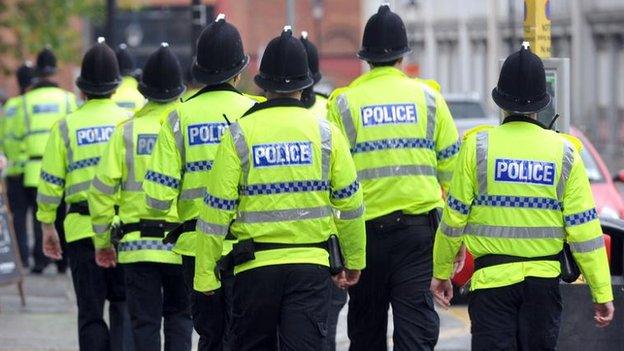Police cuts not fully understood - MPs
- Published
The Commons Public Accounts Committee says cuts to other services are increasing police work, reports Dominic Casciani
The impact of cuts to policing is not properly understood by either the Home Office or local forces, MPs have said.
The Public Accounts Committee, external said forces did not sufficiently understand demands, including how these were increasing as other services were cut.
The MPs also said forces outsourcing to make savings did not know if they were getting value for money.
The Home Office said reforms were working and frontline policing was being protected.
The highly critical report from the committee comes after forces saw their budgets fall by a quarter since 2010 - and as they prepare for further cuts.
Meg Hillier, the committee's chairwoman, said: "Too often cuts to services lead to 'cost shunting' with the police acting as the default support provider.
"There's little understanding in the Home Office and in many forces of local demands."
The committee said only about a fifth of emergency or priority calls that police responded to were crime related. It added that forces had no real data setting out where they were picking up work that could have been carried out by another service, such as a local council.
"There is also no meaningful system for ensuring senior officers have the business skills to properly run the highly complex, multi-million pound organisations under their command," said Ms Hillier.
"Evidence suggests most forces lack essential information they need to plan for the future.
"Outsourcing of services to private companies, where it happens, faces inadequate scrutiny and it is simply not possible to determine whether taxpayers are getting value for money under such arrangements."
Vulnerable people
Julia Mulligan, the police and crime commissioner for North Yorkshire, told the BBC her force faced an increased demand on Friday afternoons because "social workers phone the police once they go off shift".
She said it was "a problem that has been happening for quite some time" and that she would be speaking to local councils to find out how they can protect vulnerable people better.
"The police cannot do this on their own, we have to do this with our partners," she said.
Meanwhile, Steve White, the chairman Police Federation of England and Wales, said he had spoken to officers who were getting "hugely frustrated" because they could not provide the standard of service they would like.
"We have got to start thinking about a sustainable funding mechanism for the police service over the next five to 10 years," he added.
He also branded the 43 forces in England and Wales as a "nonsense", and called for a single nationalised police force system.
Currently, each police force's budget is made up of central government grants plus an additional "precept" that is collected as part of council tax bills.
But the committee called on the Home Office to rethink its part of the formula to take into account the different circumstances in each area.
Policing minister Mike Penning said: "Police reform is working. Over the last five years, frontline services have been protected, public confidence in the police has gone up and crime has fallen by more than a quarter over the past five years."
- Published4 June 2015
